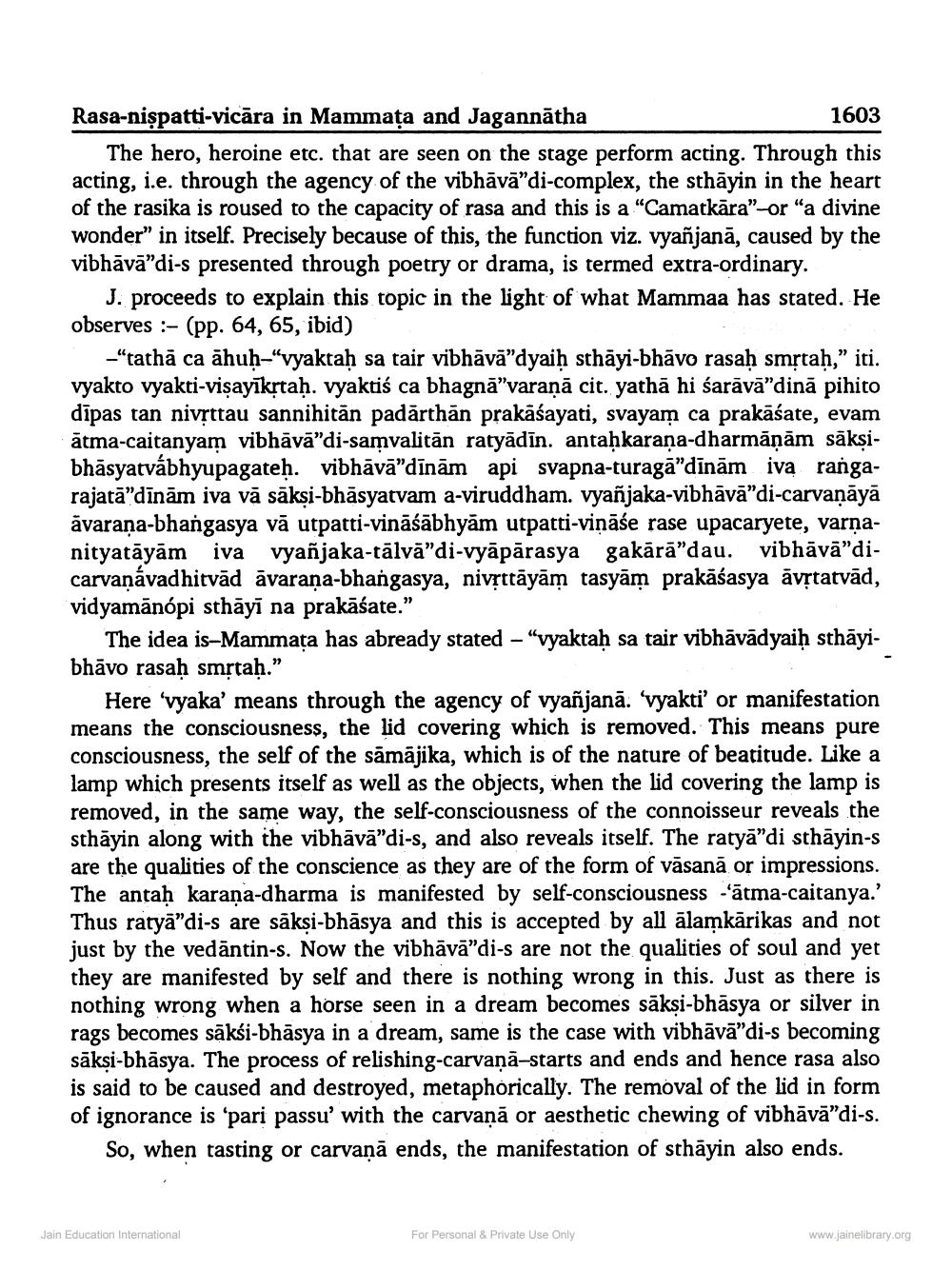________________
Rasa-nispatti-vicāra in Mammata and Jagannātha
1603 The hero, heroine etc. that are seen on the stage perform acting. Through this acting, i.e. through the agency of the vibhāvā"di-complex, the sthāyin in the h of the rasika is roused to the capacity of rasa and this is a "Camatkāra" or "a divine wonder" in itself. Precisely because of this, the function viz. vyañjanā, caused by the vibhāvā"di-s presented through poetry or drama, is termed extra-ordinary.
J. proceeds to explain this topic in the light of what Mammaa has stated. He observes :- (pp. 64, 65, ibid)
-"tath, ca āhuh-"yyaktah sa tair vibhāvā"dvaih sthāvi-bhāvo rasah smrtah." iti. vyakto vyakti-visayīkrtah. vyaktiś ca bhagnā"varanā cit. yathā hi sarāvā"dinā pihito dīpas tan nivṛttau sannihitän padārthan prakāśayati, svayam ca prakāśate, evam atma-caitanyam vibhāvā"di-samvalitān ratyādīn. antahkarana-dharmāņām sākşibhāsyatvábhyupagateh. vibhāvā"dīnām api svapna-turagā"dīnām iva rangarajatā"dīnām iva vā sākṣi-bhāsyatvam a-viruddham. vyañjaka-vibhāvā”di-carvaņāyā ävarana-bhangasya vā utpatti-vināśābhyam utpatti-vināśe rase upacaryete, varnanityatāyām iva vyañjaka-tālvā"di-vyāpārasya gakārā"dau. vibhāvā"dicarvanávadhitvad āvarana-bhangasya, nivsttāyām tasyām prakāśasya āvstarvād, vidyamānópi sthāyī na prakāśate.'
The idea is-Mammața has abready stated – “vyaktaḥ sa tair vibhāvādyaiḥ sthāyibhāvo rasaḥ smrtaḥ.”
Here 'vyaka' means through the agency of vyañjanā. 'vyakti' or manifestation means the consciousness, the lid covering which is removed. This means pure consciousness, the self of the sāmājika, which is of the nature of beatitude. Like a lamp which presents itself as well as the objects, when the lid covering the lamp is removed, in the same way, the self-consciousness of the connoisseur reveals the sthāyin along with the vibhāvā"di-s, and also reveals itself. The ratyā"di sthāyin-s are the qualities of the conscience as they are of the form of vāsanā or impressions. The antah karana-dharma is manifested by self-consciousness -ātma-caitanya.' Thus ratya"di-s are sāksi-bhāsya and this is accepted by all alamkarikas and not just by the vedāntin-s. Now the vibhāvā"di-s are not the qualities of soul and yet they are manifested by self and there is nothing wrong in this. Just as there is nothing wrong when a horse seen in a dream becomes sākṣi-bhāsya or silver in rags becomes sāksi-bhāsya in a dream, same is the case with vibhāvā"di-s becoming sākṣi-bhāsya. The process of relishing-carvanā-starts and ends and hence rasa also is said to be caused and destroyed, metaphorically. The removal of the lid in form of ignorance is ‘pari passu' with the carvaņā or aesthetic chewing of vibhāvā”di-s.
So, when tasting or carvaņā ends, the manifestation of sthāyin also ends.
Jain Education International
For Personal & Private Use Only
www.jainelibrary.org




